#making friends
Text
We ask your questions so you don’t have to! Submit your questions to have them posted anonymously as polls.
#polls#incognito polls#anonymous#tumblr polls#tumblr users#questions#polls about relationships#submitted nov 21#friends#friendship#making friends#relationships
5K notes
·
View notes
Text
That evening the men were practicing archery on the green. Bill Door had carefully ensured a local reputation as the worst bowman in the entire history of toxophily; it had never occurred to anyone that putting arrows through the hats of bystanders behind him must logically take a lot more skill than merely sending them through a quite large target a mere fifty yards away.
It was amazing how many friends you could make by being bad at things, provided you were bad enough to be funny.
Terry Pratchett, Reaper Man
#bill door#DEATH#reaper man#discworld#terry pratchett#fitting in#making friends#male friendship#reputation#pretend#undercover#psychology#group dynamics#skill#archery#logically#bad enough to be funny#amazing
2K notes
·
View notes
Text
What Making Friends Should Feel Like:
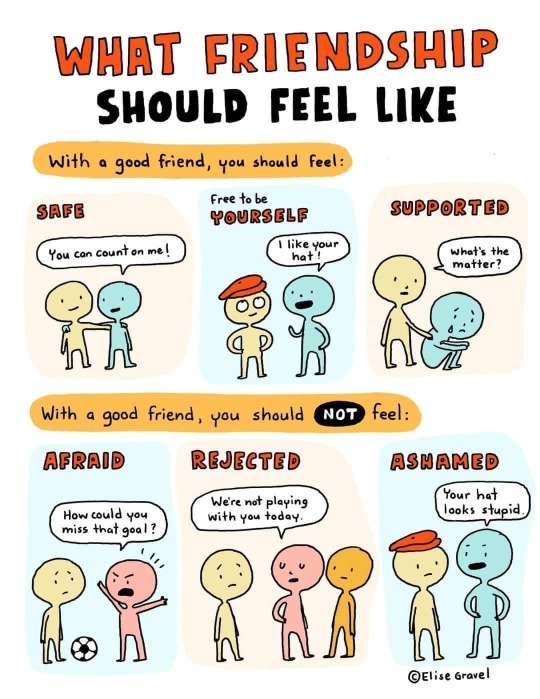
I CAN Network Ltd
#making friends#what it should feel like#friends should make you feel safe and to be yourself#you shouldn’t expect rejection from friends#friends should be supportive#mental health#mental wellbeing#feel free to share/reblog#source: I Can Network Ltd (Facebook)
1K notes
·
View notes
Text
As an autistic person I’m very confused by the idea that “making friends is easy if you put yourself out there”
How do you know who to even talk to?
I’ve had someone say “just go to the same places/groups and eventually you’ll meet someone” but like wtf does that even mean?
Do I just walk up to a person I notice a lot? Me knowing a person due to the fact that I see them often enough to remember their face is drastically different than a neurotypical talking with me apparently.
Idk if I’m just missing social cues or what but me just talking to someone about things I enjoy usually gets me a “this dude is weird” stare.
Mostly just angry at the fact that people say its easy when they don’t realize the mental gymnastics autistic people go through even talking to someone they’ve met before
#vent post#autism#actually adhd#actually autistic#neurodivergent#making friends#autistic problems#venting
12K notes
·
View notes
Text
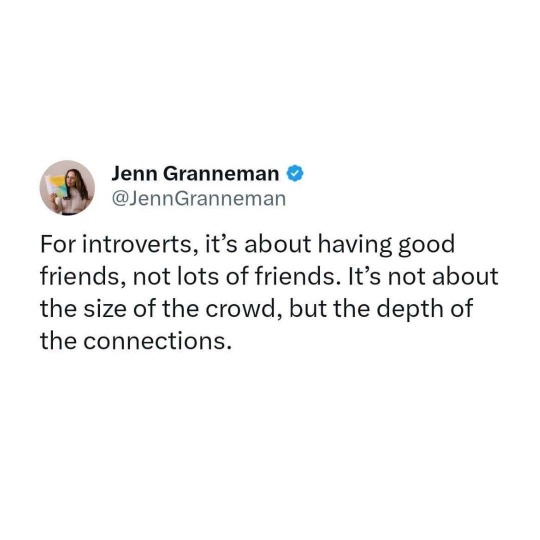
776 notes
·
View notes
Text
Manifesting truly platonic friendships with no awkward sexual tension, across all genders, and enjoying random common interests for me and all the homies
#blktumblr#black tumblr#blackgirlthoughts#black girl magic#90s baby#black women#note to self#black twitter#black tweets#manifesting#making friends#friendship#manifest#manifestyourlife#manifestingmindset#manifesting success#tumblr#tumblrlife#2023#happy new year 2023#new year#aro positivity#asexual#aromantism#asexuality
2K notes
·
View notes
Text
Femme Fatale Guide: Types of Relationships To Help You Thrive In Life
Table of Contents:
Healthy Relationship With Yourself
Peer-To-Peer Relationship
Mentorship Relationship
Goal-Oriented/Accountability-Focused Relationship
Emotionally-Intimate Relationship
Physical/Sexually-Intimate Relationship
Acquaintance Relationships
Second-Degree Relationships
Types of Relationships:
Healthy Relationship With Yourself: Internalize and act with the knowledge that you're worthy of love, care, and nourishment, and have unconditional permission to work towards your goals & dream life. Eat healthfully, drink plenty of water, remain well-rested, move your body daily, maintain proper hygiene/a clean home, invest in your appearance to feel your best, live as a life-long learner, establish healthy habits/routines, get your finances in order, establish and maintain boundaries, make positive self-talk a priority.
Peer-To-Peer Relationship: Aka friendships, which are intended to offer mutual support and joy in life. These friendships thrive on having similar values and interests, which makes these individuals your greatest cheerleaders, advice givers/receivers, and partners in crime to have fun or offer platonic love/emotional support during traditional or difficult seasons in your life. Peer-to-peer relationships should add mutual excitement, encouragement, and emotional nourishment, and provide a soundboard for confidential information exchange, ears to listen without unnecessary or superficial judgment, and solicited advice from someone who has your best interest in mind.
Mentorship Relationship: This could be a boss, teacher, professor, aunt, uncle, or another trusted adult(s) who can guide you based on their more extensive life experience/wisdom. You can have one or several mentors at any life stage and for different purposes. These people should be trustworthy (keep your information confidential unless you state otherwise) and express their advice through the lens of your best interest rather than their own personal desires or biases (at least those left unchecked). Ensure you feel safe around these people, and their presence in your life is a mutually-nourishing relationship that allows you to grow personally, professionally, and relationally.
Goal-Oriented/Accountability-Focused Relationship: A coach, mentorship, or friendship based on the achievement of a particular goal or practice. This type of relationship can manifest as an accountability partner or support group. A therapist can also fulfill this role in your life (but like, a coach, this relationship is a one-way street to offer you emotional support/tools & resources). Some reasons for an accountability-oriented relationship include helping you achieve a certain health/fitness goal, establish better routines, advance in your career, let go of unhealthy habits, patterns, or addictions, better manage your finances, or help you get your other relationships (family, partner, friends, self-talk, boss, co-workers, etc.) in order.
Emotionally-Intimate Relationship: Someone with whom you feel an unwavering emotional closeness and connection. This person can be a partner you're involved with sexually/physically intimate with or not. Asexuality exists, of course. And emotional intimacy can definitely exist in close platonic relationships (like your best friendships) without any romantic or sexual feelings. These relationships are important because they allow you to let your emotional walls down and be your vulnerable, authentic self.
Physical/Sexually-Intimate Relationship: This relationship could be with a romantic partner, FWB, with multiple partners, purely with yourself, or somewhere in between. If you have sexual needs, it's important to find pleasurable ways to satisfy these desires in a way that makes you feel most fulfilled and respected. Let go of any shame you experience when exploring this side of yourself. Experiment and learn what you like/dislike/fantasize about. Use this information to elevate your practice and communication with any partner(s) for a heightened, more enjoyable, and potentially closer emotionally-bonding experience.
Hobby/Interest-Centric Relationship: These relationships can extend from co-workers to your friends in a certain class/the one friend you go on weekly walks with, follow a particular TV show with, exchange beauty tips with, "going out" friends, etc. While these connections aren't vulnerable to the degree of a close friendship/relationship, it is important to have some relationships that are purely based on fun, light-hearted conversations, and mutual hobbies/interests/lifestyles. Having someone to share these mutual experiences with helps you feel more connected to your environment/communities, not feel isolated/lonely when your friends, family, or intimate partner has different hobbies, career aspirations, or daily routines/lifestyle compared to you, and provides a mutual soundboard on issues, insights, and exciting moments in this particular area of your life.
Acquaintance Relationships: Everyone needs those friends, co-workers, or classmates they can just chat with when at a party, a group meeting, dinner, a special occasion, to grab a quick lunch or coffee, etc. These people are fun to be around and allow you to indulge in light, easy conversations to offer temporary social support/fulfillment. These relationships also expand your network for professional opportunities, making new friends, finding dates/a potential partner, interest groups/new hobbies, referral services/classes/spaces, and other contacts that can enrich your life.
Second-Degree Relationships: These are friend-of-a-friend type connections who can be/become your future business partners, romantic/sexual partners, co-workers, investors, hairdressers, realtors, stylists, finance managers, etc. Be ready to reciprocate these offers and be this person in others' lives, too. As your network gets broader and more dynamic, better chances and potential there is to connect with the right people to help you achieve your goals, desires, and overall life satisfaction. Success and efficiency rarely – if ever – exist in isolation.
#relationships#interpersonal relationships#networking#making friends#dating#social interaction#socializing#social connections#interpersonal skills#communication skills#networking opportunities#social networks#life advice#glow up tips#glow up era#level up journey#femme fatale#higher self#it girl#high value woman#high value mindset#success mindset#healthy lifestyle#successhabits#female excellence#dream girl#queen energy#female power#femmefatalevibe
744 notes
·
View notes
Text



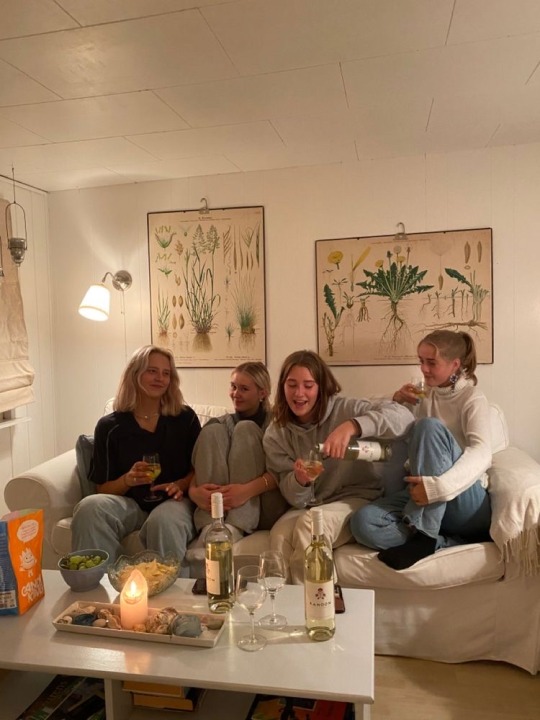
On Being Socially Accepted / Well Liked
Human beings are sociable animals. No matter the degree of sociability, there’s a part of us that wants to be loved, nurtured and accepted by those around us.
I didn’t want to make a guide of how one should be likeable, because if you think a little - from all the people you like, do you like them for the same reason? Not necessarily. You may like one friend for their humour; another for being a solid person thick and thin; a third for their extroverted personality… we’re all different and should be!
Now, you may have certain qualities that you want in all your relationships, regardless of the person. For instance, I’m very adamant about transparency and loyalty. Loyalty to me doesn’t mean standing up for me even if I’m wrong - it means caring for me enough to tell me I’m wrong. However, these qualities wouldn’t make you likeable per se - they would make you accepted within a social circle.
So how does one become likeable?
1. Ease up on the doormat culture
You’ll notice that most of the people you like are capable of having an independent opinion and thought. People pleasers may come across as inauthentic and dicey, especially the ones who change their opinion to agree with the majority. So start cutting out the people pleasing behaviour.
2. Have hobbies
You’ll generally gravitate more towards someone who seems to have their life together as opposed to someone who doesn’t. I’m always keen to talk to someone who does something a little different in their free time. I remember talking to a physicist who also wrote poetry - I was very intrigued by his work, and I invited him to my NYE party along with his girlfriend.
Now, there’s nothing wrong with not having your life together as long as you’re at least trying to make it better. Hobbies don’t have to be expensive. It’s also a better way to expand your circle- not all your friends will enjoy pottery or tennis, for instance.
3. On emotional/ trauma dumping
The worst people to guide you in life, my father always told me, are your friends. Blind leading the blind.
Your friends may have a good heart but not necessarily good advice. Keep the trauma dumping to a minimal unless your friend is okay with you sharing more. Bear in mind that even as a listener, when you hear someone’s traumatic experiences, you may feel emotionally overwhelmed.
Never share your private experiences, current situations, drama, problems, gossip with acquaintances or friends who you’re not particularly close to. Trust me, it can be tempting to engage in catty behaviour but there’s a good chance it’ll bite you in the ass.
4. Figure out your strengths
I know what I bring to the table when it comes to friendship - gentle honesty, alternative solutions and perspectives to issues and I’m always a planner.
One of my friends is a blunt critic and I always speak to her when I know I need a reality check about life.
Another friend is very non judgemental, she’s the one I open up to about the weird things I think of.
A third friend is my party friend, who is 100% the life of the party and I love his energy.
We can’t share the same relationship with everyone. Understand your strengths and hone them.
5. Likeable people don’t care about being likeable
Become detached from this idea of “I want to be liked.” Rather than that, I feel the statement “I want relationships who accept me for who I am” make more sense. As you grow older, you’ll realise that this teenager definition of popularity is nothing but inauthentic bullshit. You deserve friends who care for you and cheer you on.
The idea of “I want to be liked/ popular” also low-key reeks of desperate behaviour. It shows that you don’t really care about your thoughts or opinions as long as you’re accepted and you’re ready to modify your opinions to fit in. That’s the worst way to making friends because you literally can’t be yourself.
6. Yes, looks do matter
Looks do matter to a degree. I don’t mean that in a sense of physical features - I mean it from a sense of grooming.
I’ve noticed that people will be taken more seriously if you look a certain way. That doesn’t mean you have to buy stuff until your money runs out - it just means being at a healthy weight, dressing well, practicing personal hygiene.
7. Observational skills
Whenever I’m at an event and I notice someone feeling left out, I go and talk to them.
I remember being in the shoes long ago and feeling uncomfortable going to places. So when I see someone in the same position, I try to be the person I wanted at that point of time.
It’s important to have keen observation skills but what’s even more important is dealing with it subtly. I remember a girl at a party wearing a dress with the price tag still attached to the neckline at the back. I casually went over, put a hand on her back, discreetly whispered that her tag was out, should I put it back in? She said yes, and I put the the tag inside her dress without people around us noticing me. Discretion is a must in life. Don’t shout your good deeds- do them, don’t get flattered by compliments when people tell you that you were nice, and just play it off like it’s not a big deal.
8. Being impolite
I read a study that polite people are harder to connect with. Overly polite people can be seen as boring and that you need more energy to talk to them because the conversation only revolves around a few “polite” topics (studies, career, life in general, how nice the establishment is, the weather, common friends… surface conversation). I’m not saying don’t be considerate - I’m saying don’t be overly polite. Don’t be over accommodating to other people. You can disagree with things respectfully. You can share a different perspective or crack a joke.
9. What are you like?
Are you better one on one or in groups?
I’m a much better person one on one. I resonate with people better when we have a conversation - when it’s a group, it’s just the usual hi-hellos.
You may prefer groups, if one on one conversations seem too vulnerable.
How do you figure this trait out? Ask yourself a simple question : if you had a meet a new person, would you rather meet them alone at a cafe or at a party with your friends?
Figuring this out is important because it gives you a sense of the relationships you value and how you can take them forward.
10. A balanced ratio of talking and listening
Try to listen more than you can talk. This advice is useless if you’re talking to an introvert. With most introverts I’ve noticed that they WILL talk to you - as long as they don’t have to make the first move. Once you set the ball rolling, they’re happy to talk.
So you have to understand how and when to switch being an active listener and speaker.
A simple generalised guide:
When dealing with extroverts: ask basic/ generic/ yes or no questions, give opposing opinions (most extroverts are generally up for a challenge) and listen more in the beginning, switch to talking more later.
When dealing with introverts: again, ask questions but you can make them more subjective than objective, less generic and definitely no yes/no questions. Talk more in the beginning and then listen more later, to make them comfortable.
#c suite#powerful woman#ceo aesthetic#personal growth#that girl#productivity#strong women#getting your life together#feminine energy#balance#on being likeable#likeable#popular#friends#making friends#authentic friendship#dealing with personalities#personalities#introvert#extrovert#queen b
1K notes
·
View notes
Text
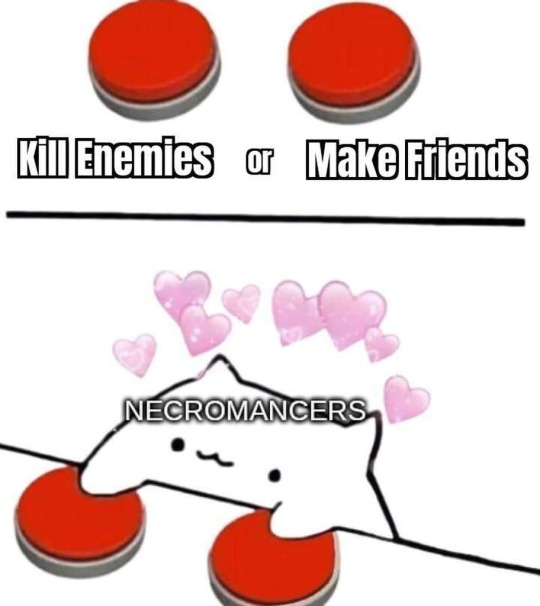
#dank memes#funny post#meme#dank#funny#funny pics#silly#funny pictures#dankest memes#humor#dark humor#lol cats#necromancers#making friends
320 notes
·
View notes
Text
"Grayson didn't have any friends."
"Tobias Hawthorne was not in the business of making friends."
Why did this similarity hit me so hard?
#the inheritance games#the brothers hawthorne#the hawthorne legacy#the final gambit#the grandest game#grayson hawthorne#tobias hawthorne#making friends
75 notes
·
View notes
Text
We ask your questions so you don’t have to! Submit your questions to have them posted anonymously as polls.
#polls#incognito polls#anonymous#tumblr polls#tumblr users#questions#polls about relationships#submitted dec 1#friends#socializing#making friends#social skills#lonely
538 notes
·
View notes
Photo
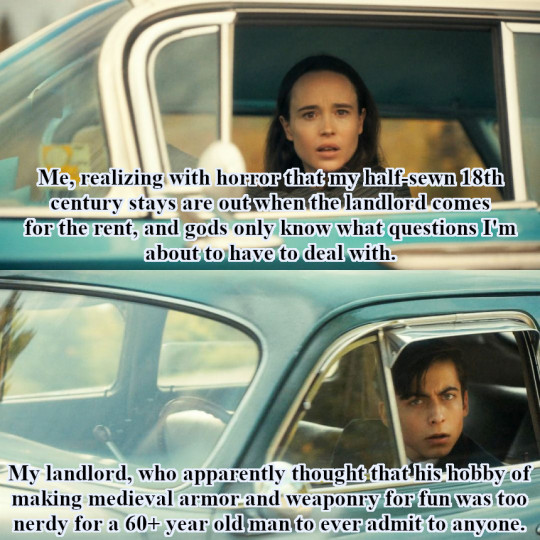
In case anyone’s wondering how our move to Madrid is working out, today involved my landlord toting a duffel bag full of chainmaille, plate armor, and a broadsword up to our apartment so he, my husband, and I could all nerd out about historical clothing together. The three of us wound up comparing notes through broken English, terrible Spanish, and Google Translate for an hour.
Landlord: has mad metalworking and leatherworking skills, but no sewing skills and minimal woodworking skills. Needs a gambeson for his chainmaille and wants a wooden horse crest for his plate helmet. Can’t speak English well enough to find tutorials on YouTube.
My husband: has some metalworking skills including several years of making chain maille whne we were in uni, and mad woodworking skills including beginning carving. Has been wanting to learn to make swords for longer than we’ve been married.
Me: Has intermediate sewing skills, mostly in historical clothing and making quilts, is a native English speaker who knows how to find just about any skill set tutorial on YouTube. Has been wanting to experiment with medieval clothing.
Today has been a good day, y’all.
#hobbitpunk#sort of anyway#making friends#historial reenactment#historical costuming#historybounding
867 notes
·
View notes
Text
Autism & Friendship
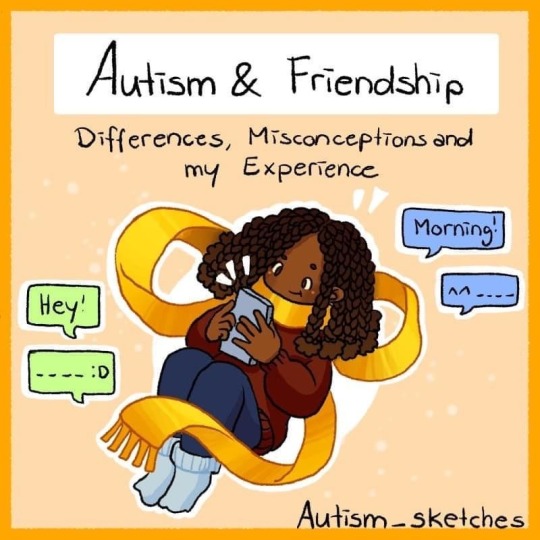


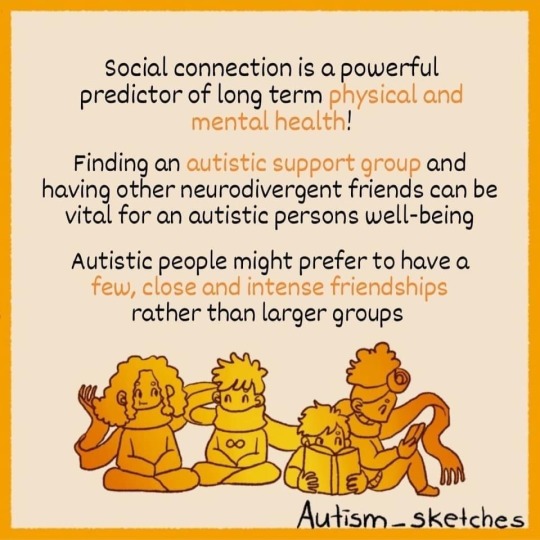
I CAN Network Ltd
#autism#actually autistic#friendship#autism & friendship#making friends#socializing#communication#neurodivergence#neurodiversity#actually neurodivergent#I CAN Network Ltd (Facebook)
315 notes
·
View notes
Text
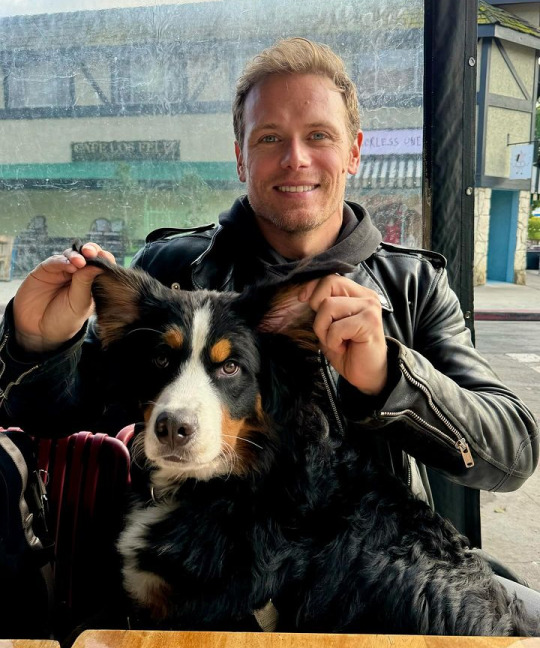
📷 samheughan IG : "Making friends.... 🫶🐶 @eshornstein "
73 notes
·
View notes
Text
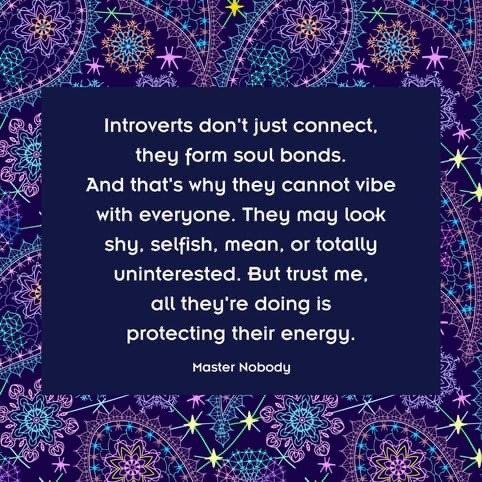
#spiritual awakening#spiritual awareness#wisdom#introvert life#introverts#introverted#introvert#making friends
656 notes
·
View notes
Note
Hi! I'm autistic (self-diagnosed) I can't really get an official diagnosis, I feel broken, defective and lonely and because of the self-diagnosis I sometimes feel like a fraud. I feel I don't fit in anywhere, not even with autistic people. I was in an online group with autistic people and even there I felt alienated and ignored. I just write this to let off steam, I don't know if I'll ever find friends who accept me for who I am, apart from that I'm not good at interacting with new people. Since I have memory I've felt like an alien.
I understand, I've often felt the same, both pre and post diagnosis. Being autistic (including self diagnosed which is 100% valid!) can be really hard, especially with social stuff - it's part of the criteria after all.
It's a common idea that autistic people will get on with other autistic people, but that's not always the case; every autistic person is different, just like every allistic person is different. We all have different personalities, likes and dislikes, so two people aren't necessarily going to be friends just because they're both autistic. And that's OK.
At the same time, there are so many people in the world, you are guaranteed to have things in common with some of them, and you will find people who care about you and accept you. They may be in your life already and you just haven't discovered it yet.
You might find it helpful to read Unmasking Autism by Dr Devon Price, particularly Chapter Seven: Cultivating Autistic Relationships. He talks about the idea of finding your 'strawberry' people - people who have been kind and loving towards you - and putting energy into those relationships, while putting less energy into less positive relationships.
I know it's hard, and it can take a lot of effort, but please keep trying! There are a lot of kind and accepting people out there and I promise you will find them ❤️
#anon ask#autism#actually autistic#autistic#neurodivergent#making friends#relationships#advice#its a spectrum
114 notes
·
View notes